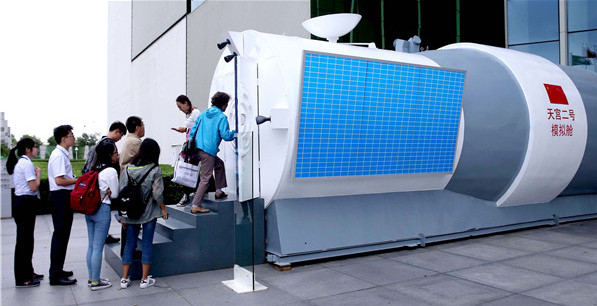
People line up to examine a replica of the Tiangong-2 space laboratory at the China Science and Technology Museum in Beijing on Sunday.(CHEN XIAOGEN/CHINA DAILY)
China Aerospace Science and Technology Corp aims to "double or even triple" its annual production capacity by 2025 while without adding new employees--as the State-owned satellite and rocket maker ratchets up efforts to achieve smart and flexible manufacturing--its chief engineer said.
CASC Chief Engineer Yang Haicheng told China Daily that in the next five to 10 years the aerospace industry would see huge demand for rockets and satellites.
"If the annual orders triple from 100 billion yuan ($15 billion) to 300 billion yuan, it is impossible for us to triple the amount of employees," he said on the sidelines of a manufacturing forum in Beijing on Friday.
"Instead, we must rely on smart manufacturing to accomplish these tasks."
The Beijing-based company currently has about 180,000 employees, nearly 100,000 of which are researchers and engineers, which has laid down a solid foundation for high-tech manufacturing, Yang added.
CASC is responsible for making China's satellites, missiles, carrier rockets, space station and other aerospace equipment.
In 2015, it recorded an annual revenue of $30.5 billion, the 12.5 percent year-on-year rise catapulting its ranking on the Fortune 500 list to 344th from 437th the previous year.
The production capacity target is part of a broader plan that the Beijing-based group is working on to coordinate its operations with the country's Made in China 2025 initiative, which aims to promote high-end manufacturing in factories nationwide, Yang said
"We also want to shorten the production cycle. In the past, it took three to four years to develop a satellite. Now we are working hard to shorten the process to one year, or even to several months or several days in times of war," he added.
The chief engineer said the aerospace industry involved the most sophisticated and complicated design and production process, which the company wanted to simplify by putting all of it online.
"We are eyeing a transition from total self-reliance to building an open platform where we will seek resources and partnership from other international players," Yang added.
"We will focus not only on design and production but also on operations and services."
Wang Ya'nan, editor-in-chief of Aerospace Knowledge magazine, said China's aerospace industry had entered a rapid growth stage that required space enterprises to undertake more innovation in terms of research, development and production techniques.
"The government has placed high importance on the space-based information system, deep-space and lunar exploration program and manned space activities. It is also boosting the commercial space sector to compete with other space powers such as the United States," he said.


















































